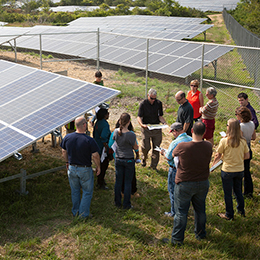
Sustainable Energy Systems, M.Eng. Focus
Earn a Master of Engineering in Sustainable Energy Systems and become an important part of the energy solution.
CEE is now offering CEE and Engineering Management courses addressing sustainable energy systems.
- CEE 4210 - Renewable Energy Systems
- CEE 4565/6565 - Waste Water Processes and Resources Recovery
- CEE 4660 - Modeling and Computation for Infrastructure Systems
- CEE 5420 - Energy Technologies and Subsurface Resources
- CEE 5970- Risk Analysis and Management
- ENMGT 6095 - Economics of the Energy Transition
Sustainable energy is a challenging and exciting field in which engineering students can apply their skills.
Sustainable energy projects combine environmental analysis of pollution reduction and climate protection benefits of energy technologies, as well as the economic feasibility assessment of investment. A wide range of energy resources that do not emit greenhouse gases in their end use are under development in the U.S. and many other countries, including wind, solar, hydro, biomass, and geothermal, among others. At the same time, these primary energy sources must be adapted and transformed for applications such as electricity generation, heating and cooling of buildings, and transportation of passengers and freight. Trends in government policy toward reducing emissions, the willingness of investors to commit funding, and local support of or opposition to energy projects play a role as well.
| Course Number | Course Title |
|---|---|
| MAE 4020 | Wind Power |
| MAE 4120 | Community Wind Energy Research |
| CEE 4210 | Renewable Energy Systems |
| CEE 4565/6565 | Waste Water Processes and Resources Recovery |
| EAS 4570 | Atmospheric Air Pollution |
| CEE 4660 | Modeling and Computation for Infrastructure Systems |
| BEE 4760 | Solid Waste Engineering |
| BEE 4870 | Sustainable Bioenergy Systems |
| MAE 5010 | Future Energy Systems |
| CEE 5420 | Energy Technologies and Subsurface Resources |
| CEE 5970 | Risk Analysis and Management |
| ENMGT 6095 | Economics of the Energy Transition |
| EAS/MAE 6480 | Air Quality & Atmospheric Chemistry (Offered Alternate Years) |
| CEE 6648 | Sustainable Transportation System Design |
Sustainable Energy Systems, M.Eng. specialization project
The M.Eng. program requires an engineering project of 3-6 units over 1-2 semesters.
Local Sustainable Energy Alternatives for Cornell and Surrounding Areas
Environmental Engineers have in recent years participated in Master of Engineering Team Projects to assess the feasibility of carbon-free energy alternatives around Cornell, the City of Ithaca, and surrounding Tompkins County. These sustainable energy projects combine environmental analysis of pollution reduction and climate protection benefits of energy technologies, as well as economic feasibility assessment of investment in them.
Past local partners include the Ithaca Area Waste Water Treatment Facility (IAWWTF), the Chainworks District project to repurpose the former Emerson Transmission plant on Ithaca’s South Hill, the Cayuga Medical Center, and our local public transportation provider Tompkins Consolidated Area Transit (TCAT). Some projects seek to increase local production of renewable energy from solar, wind, hydro, or biomass. Others capture energy resources from the waste stream, including heat and biological content in waste water as well as waste food and municipal solid waste. There is interest at IAWWTF in an emerging technology known as Effluent Thermal Energy Recover, or ETER, whereby thermal energy in treated wastewater is extracted and distributed for space heating purposes in buildings. In summer, the wastewater can be used as a heat sink for cooling buildings.
A goal is to combine energy generation with improved resiliency through the development of energy microgrids and district heating and cooling systems, which have been studied as well in some of the projects. Environmental M.Eng. students interact with M.Eng. students from other majors on these projects, and have an opportunity to present findings to the community and circulate their final reports among local stakeholders.
For additional information, see:


